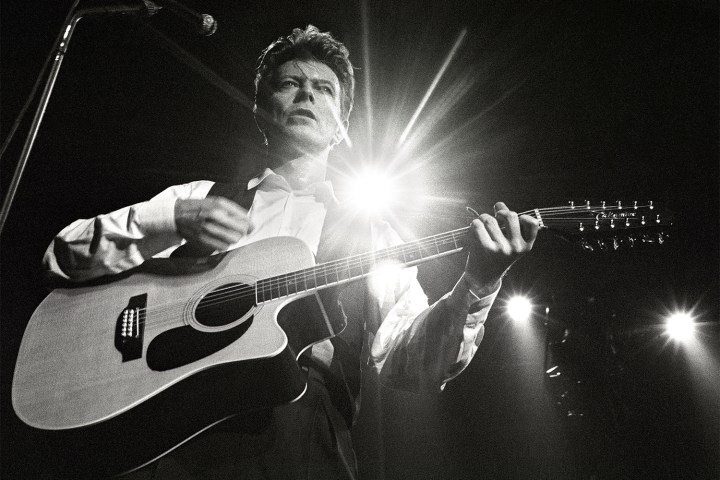
Bowie changed his name from Davie Jones early in his career to avoid confusion with The Monkees singer of the same name, and it seems he never stopped changing from that point on.
The seminal artist always had a new and spectacular invention of himself: from the iconic Stardust days, through the Station to Station era (in which he purportedly went on a diet of milk, cocaine, and red peppers as The Thin White Duke), through the spiffed and shiny Let’s Dance days of the ‘80s, and on into the present. In his 1996 concept album, Outside, there’s an interlude in which a computerized voice rambles about “artistes” in tunnels, and “ape men with metal parts.” And we smiled, because that’s Bowie.
His collaboration with Trent Reznor during that era with the single, I’m Afraid of Americans, was one of a dozen reinventions that exposed Bowie to a new audience. But let’s face it: There was no one even tangentially interested in rock music who didn’t already have some relationship with Bowie by then. Even for those who didn’t appreciate every face of the chameleonic rock god, no self-respecting music lover would say that any album Bowie did wasn’t cool, or interesting, or, at the very least, unique.
A multi-instrumentalist who spent his early time studying art, design, and music, Bowie, at age 15, gave up his job as an electrician’s apprentice to start his first band and try his hand at being a pop star. Bowie was a man who wanted to do art for art’s sake, at any cost. He was a space poet who grew up shaping multiple artistic mediums, even writing a blazing tribute to cultural icon and artist Andy Warhol (though Warhol reportedly didn’t like the song). Bowie’s constant evolution is a rare example of a man who knew he’d never attain perfection, sought it anyway, and loved every minute of it.
Bowie didn’t follow roads or maps, he charted them with each new iteration of himself. He wasn’t just a musical legend, he was a nebula of musical gas and dust, spawning countless other legends. They followed his inspiration, and through their emulation, they created entirely new musical landscapes that echoed with the influence of the Big Bang that was Bowie.
Music aside, Bowie’s style alone was the stuff of creation. His early androgyny spawned legions of copycats and fellow outsiders who leveraged his creative freedom as their own expression of personal reflection. He ignited an awakening that accelerated style and culture. He was the constant innovator, always rewriting his look along with his sound — as if the two were one. Even in his occasional acting stints, Bowie left a serious cultural imprint. His odd turn as the Goblin King from Labyrinth is part of the curriculum for Gen X’ers still wondering exactly what it was they saw, and why it was so great.
And now we must accept that this legend is no longer contributing his alien madness to the cultural pool. It’s hard to take in. Today’s news is especially hard because it is so sudden. The artist released his new album, Blackstar, just two days ago, and though it had been reported he would no longer tour, it was not publicly stated the halt was due to health issues. Bowie battled the cancer that would take his life in relative silence for a reported 18 months.
For those of us who’ve tried walking in Bowie’s footsteps and launching a career in music, it’s especially hard to endure the passing of such a brilliant beacon of artistry. But there is no doubt that Bowie had a supernova-sized effect on the planet he called home for nearly seven decades. His passing is the end of an era, and a monumental loss in his medium.
Still, there’s some solace to be found in the grand collection of music and imagery left behind. Gone, but never forgotten, we’ll always have the music to remember each and every evolution of the man they called Bowie. May you rest in peace, Mr. Jones, Mr. Bowie, and Mr. Stardust, too. You will be missed.
Follow us above to check out our Remembering David Bowie playlist, which follows the artist through the ages in chronological order.


